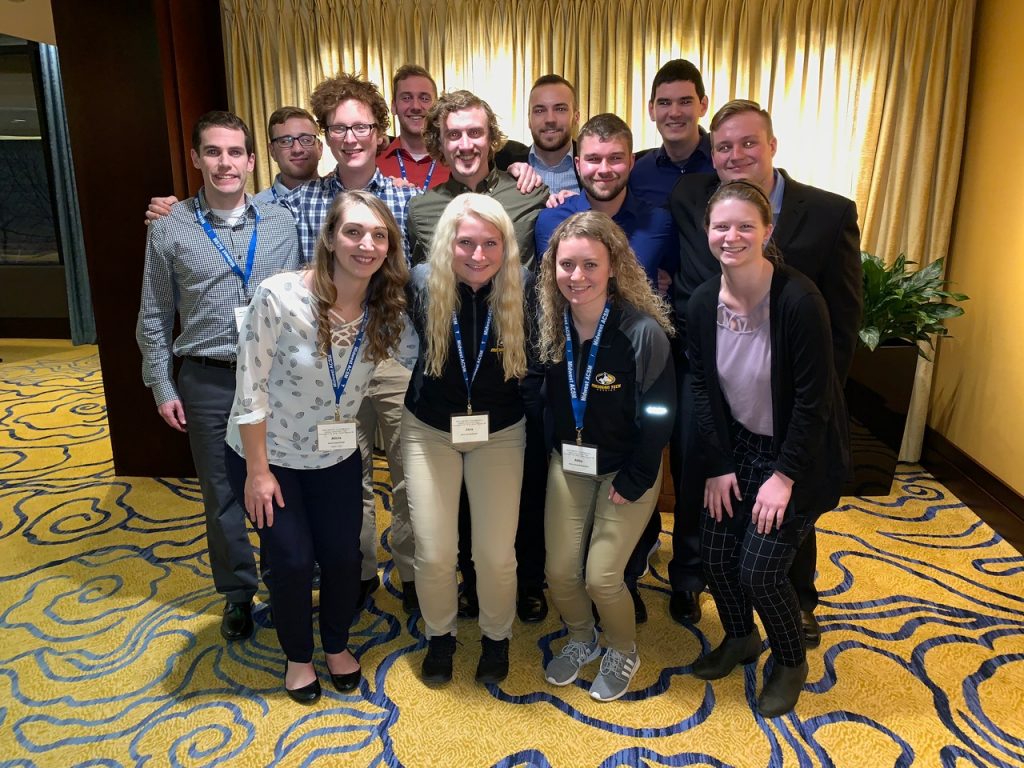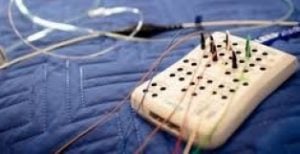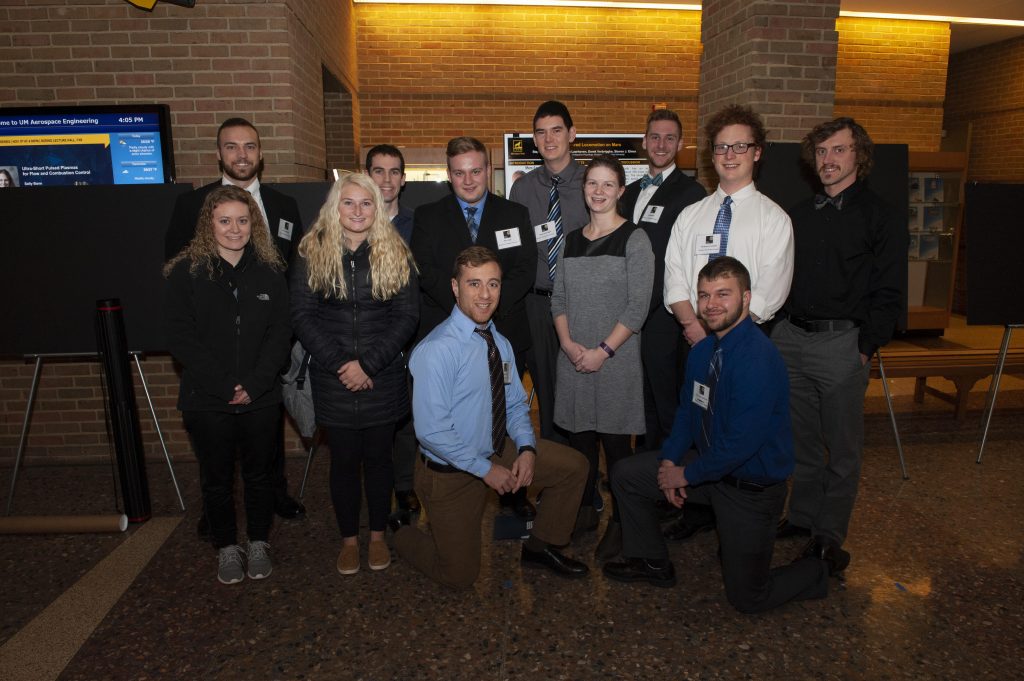
From left to right, top row: Jeremy Bigalke (MS), Dr. Steven Elmer, Alex Gabe (MS), Derek Verbrigghe (MS), Hannah Cunningham (MS), Thomas Bye (MS), Benjamin Cockfield (Undergrad), Kevin Phillips (PhD); bottom row: Abby Sutherland (Undergrad), Jana Hendrickson (Undergrad), Stephen Hook (MS), Kelvyn Van Laarhoven (MS).
Twelve KIP students, including undergraduate, Masters, PhD and DPT students, recently had the opportunity to travel downstate with Assistant Professor Dr. Steven Elmer to attend and present their research at two regional academic conferences.
On Friday November 9, students attended the Midwest American College of Sports Medicine (ACSM) conference in Grand Rapids, MI. Doctor of Physical Therapy (DPT) student Alicia Denherder from Central Michigan University’s MTU satellite DPT program gave a presentation of her research on exercise with blood flow restriction after total knee replacement or reconstruction.
Three KIP undergraduate students, Abby Sutherland, Jana Hendrickson and Benjamin Cockfield represented Michigan Tech in the annual ACSM Jeopardy competition against students from twenty other universities. They finished the competition as one of the top ten competitors.
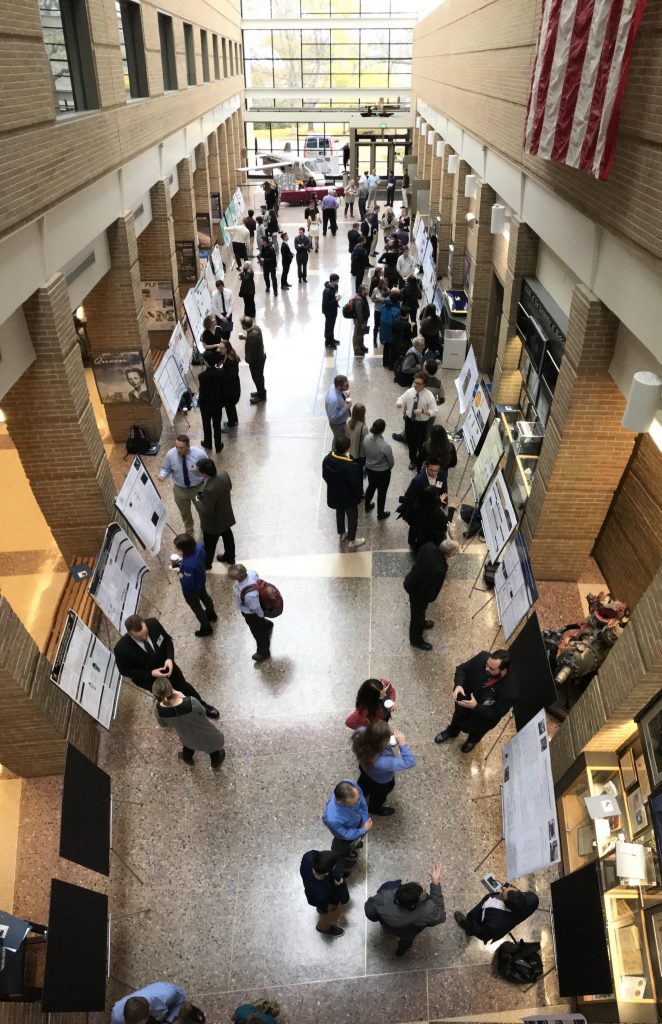
On Saturday, students continued their journey to the University of Michigan in Ann Arbor to attend the 2018 annual Michigan Space Grant Consortium (MSGC) conference. This conference highlights research by aspiring students, academics, industry leaders and community members related to space and NASA strategic interests.
In addition to their annual conference, the MSGC awards annual undergraduate and graduate fellowships for research aimed at advancing our knowledge and understanding of space. KIP PhD student Kevin Phillips and Masters student Thomas Bye were among a total of fifty MSGC award recipients who presented at the conference last weekend.
“We are unsure of how [liquid cooling garments worn by astronauts in space] influence the mental workload of human brain activation, or the perception of fatigue during physical activity.” -Kevin Phillips, PhD candidate, KIP
Integrative Physiology PhD candidate Kevin Phillips presented research funded through an MSGC Graduate Fellowship where he investigated the effects of water immersion on pre-frontal cortex activation in humans.
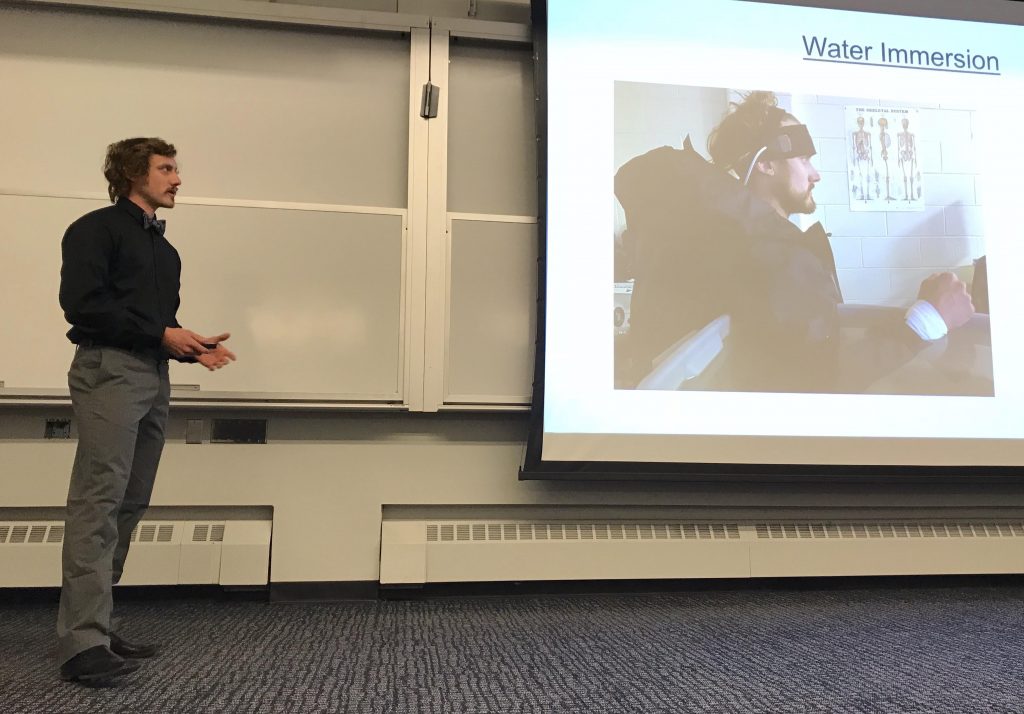
“Astronauts wear liquid cooling garments in space to help with their body’s thermoregulation,” explains Phillips. “However, we are unsure of how this influences the mental workload of human brain activation, or the perception of fatigue during physical activity. I use a variety of techniques in my research to develop a better understanding of the effects of thermal alterations on the human brain.”
“It was wonderful to get both my first and second oral presentations under my belt.” -Thomas Bye, MS Student, KIP
Kinesiology MS student Thomas Bye also presented MSGC Graduate Fellowship-funded research at the conference on Saturday. He has been examining the impact of respiratory muscle fatigue during space flight.
“Astronauts are always moving in space, primarily with their arms,” Bye explains. “In order to stabilize themselves in micro-gravity they must use their upper-body muscles. This causes muscles such as the diaphragm to become tired and their breathing and performance to become compromised during space walks.”
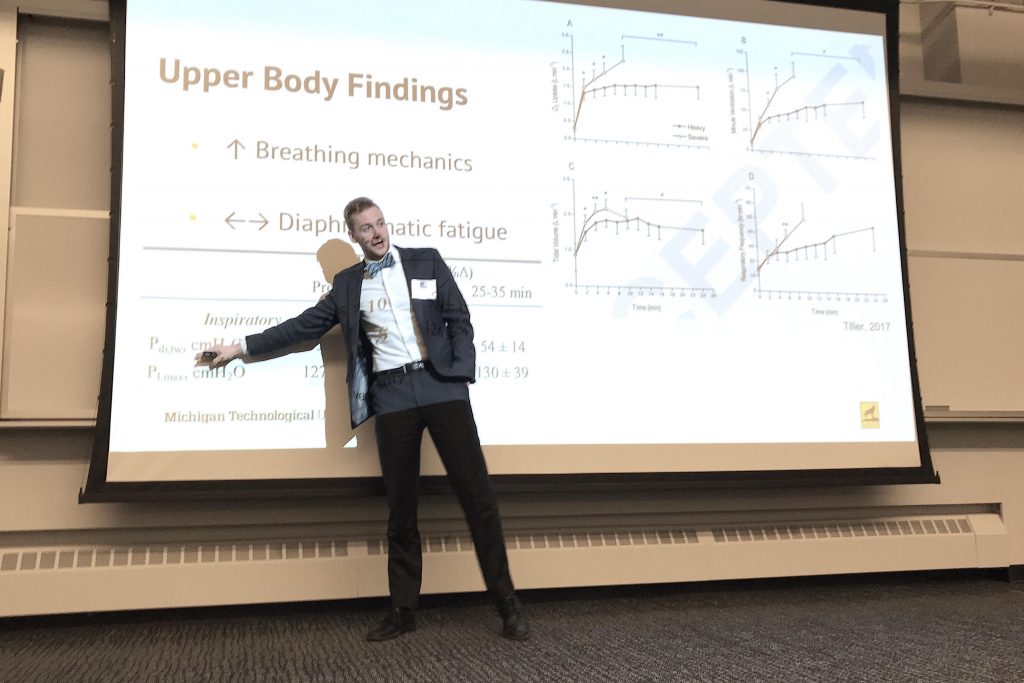
All twelve KIP students either presented posters or gave oral presentations at the MSGC conference. Some, like Phillips and Bye, gave presentations on their independent research projects.
“In order to stabilize themselves in micro-gravity [astronauts] must use their upper-body muscles. This causes muscles such as the diaphragm to become tired and their breathing and performance to become compromised during space walks.” – Thomas Bye, MS student, KIP
Masters students gave presentations based on projects they had completed for their Advanced Exercise Physiology (KIP 5000) class this Fall. MS students Hannah Cunningham and Jeremy Bigalke presented their analysis of the new Mars extra-vehicular suit, and its implications for affecting human metabolism, the walk-to-run transition, and its theorized cost of transport.
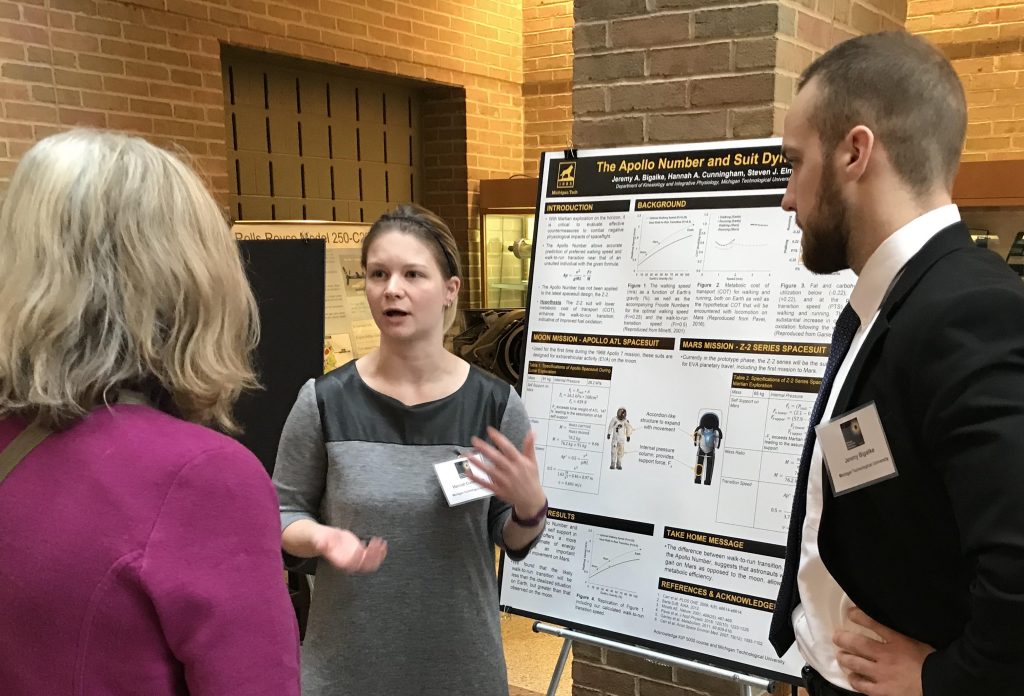
Undergraduate students Abby Sutherland and Jana Hendrickson gave presentations regarding their experiences in kinesiology-based K-12 outreach projects. One undergraduate student, Benjamin Cockfield, presented results obtained from exploring effective techniques of teaching physiology – specifically, skeletal muscle contraction.
“I began by improving the current muscle contraction model used in the undergraduate anatomy and physiology lab course to include several key molecular structures that were omitted in previous models,” Cockfield explains. “We also wanted to determine if adding a stair climbing activity would help improve real-world understanding of muscle contraction – specifically eccentric, or lengthening, muscle contraction.”
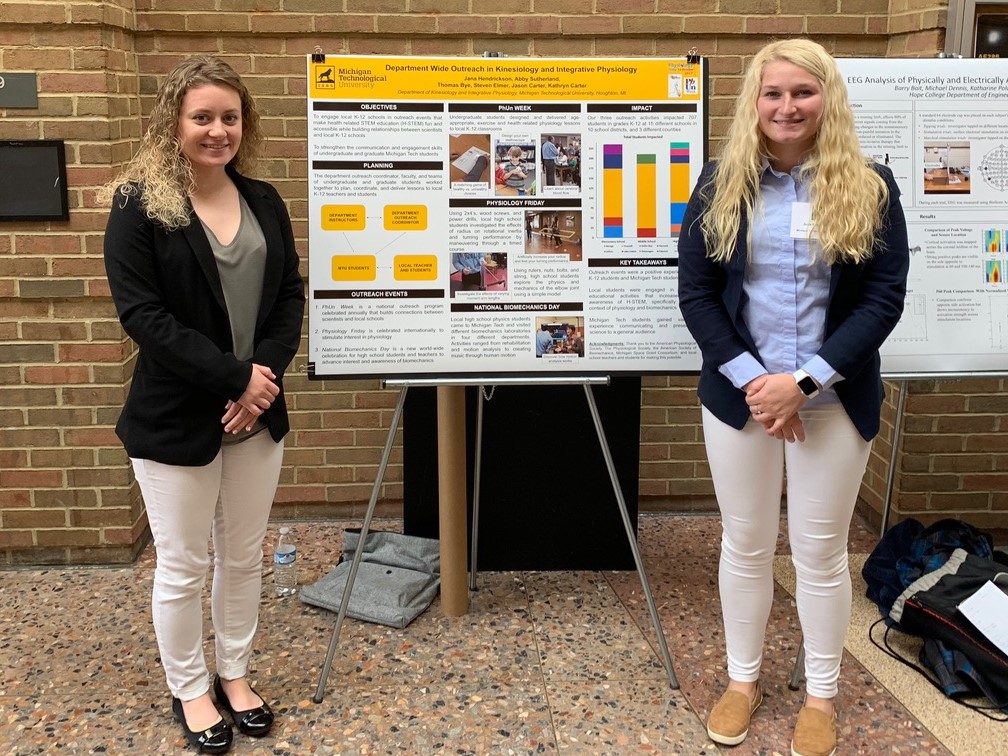
Cockfield and his team implemented the stair climbing activity in half of the anatomy and physiology lab sessions, and had students in all lab sessions complete surveys to determine the students’ perception of the effectiveness of the activity in helping to improve their understanding of muscle contraction. Results showed an improved understanding of the molecular mechanisms of muscle contraction with Cockfield’s improved teaching model.
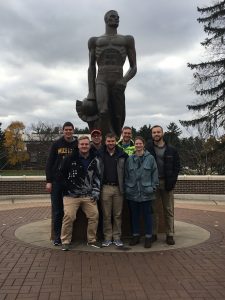
In addition to the two academic conferences attended, masters students from the KIP 5000 class had an opportunity to visit with faculty at Michigan State University during their trip. Specifically, students met with Dr. Erica Wehrwein and Dr. Stephen DiCarlo in MSU’s Department of Physiology and Dr. Christopher Kuenze in the Department of Kinesiology. Students were able to tour research labs, ask questions, and meet students and research staff in each department; an invaluable networking opportunity for these young students.
“The trip was a blast,” says KIP Masters student Thomas Bye. “It was wonderful to get both my first and second oral presentations under my belt. I got lots of great feedback, had good discussions, and even got to have pizza with the legendary Dr. DiCarlo.”
Our students would like to thank the Graduate Student Government, Department of Kinesiology and Integrative Physiology, Dr. Elmer’s research laboratory, and the MSGC for supporting their travel and helping to make this experience possible.
